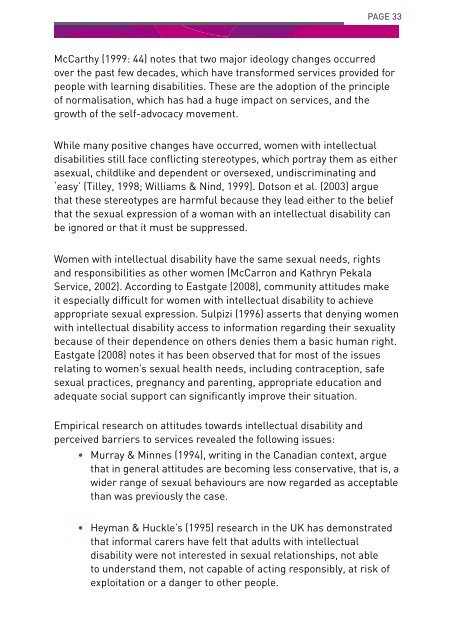Literature Review on Provision of Appropriate and Accessible ...
Literature Review on Provision of Appropriate and Accessible ...
Literature Review on Provision of Appropriate and Accessible ...
You also want an ePaper? Increase the reach of your titles
YUMPU automatically turns print PDFs into web optimized ePapers that Google loves.
PAGE 33<br />
McCarthy (1999: 44) notes that two major ideology changes occurred<br />
over the past few decades, which have transformed services provided for<br />
people with learning disabilities. These are the adopti<strong>on</strong> <strong>of</strong> the principle<br />
<strong>of</strong> normalisati<strong>on</strong>, which has had a huge impact <strong>on</strong> services, <strong>and</strong> the<br />
growth <strong>of</strong> the self-advocacy movement.<br />
Support to People with an Intellectual Disability who are<br />
<strong>Accessible</strong><br />
<strong>and</strong> <strong>Appropriate</strong> <strong>of</strong> Provisi<strong>on</strong> <strong>on</strong> <str<strong>on</strong>g>Review</str<strong>on</strong>g> <str<strong>on</strong>g>Literature</str<strong>on</strong>g><br />
Experiencing Crisis Pregnancy<br />
While many positive changes have occurred, women with intellectual<br />
disabilities still face c<strong>on</strong>flicting stereotypes, which portray them as either<br />
asexual, childlike <strong>and</strong> dependent or oversexed, undiscriminating <strong>and</strong><br />
‘easy’ (Tilley, 1998; Williams & Nind, 1999). Dots<strong>on</strong> et al. (2003) argue<br />
that these stereotypes are harmful because they lead either to the belief<br />
that the sexual expressi<strong>on</strong> <strong>of</strong> a woman with an intellectual disability can<br />
be ignored or that it must be suppressed.<br />
Women with intellectual disability have the same sexual needs, rights<br />
<strong>and</strong> resp<strong>on</strong>sibilities as other women (McCarr<strong>on</strong> <strong>and</strong> Kathryn Pekala<br />
Service, 2002). According to Eastgate (2008), community attitudes make<br />
it especially difficult for women with intellectual disability to achieve<br />
appropriate sexual expressi<strong>on</strong>. Sulpizi (1996) asserts that denying women<br />
with intellectual disability access to informati<strong>on</strong> regarding their sexuality<br />
because <strong>of</strong> their dependence <strong>on</strong> others denies them a basic human right.<br />
Eastgate (2008) notes it has been observed that for most <strong>of</strong> the issues<br />
relating to women’s sexual health needs, including c<strong>on</strong>tracepti<strong>on</strong>, safe<br />
sexual practices, pregnancy <strong>and</strong> parenting, appropriate educati<strong>on</strong> <strong>and</strong><br />
adequate social support can significantly improve their situati<strong>on</strong>.<br />
Empirical research <strong>on</strong> attitudes towards intellectual disability <strong>and</strong><br />
perceived barriers to services revealed the following issues:<br />
• Murray & Minnes (1994), writing in the Canadian c<strong>on</strong>text, argue<br />
that in general attitudes are becoming less c<strong>on</strong>servative, that is, a<br />
wider range <strong>of</strong> sexual behaviours are now regarded as acceptable<br />
than was previously the case.<br />
• Heyman & Huckle’s (1995) research in the UK has dem<strong>on</strong>strated<br />
that informal carers have felt that adults with intellectual<br />
disability were not interested in sexual relati<strong>on</strong>ships, not able<br />
to underst<strong>and</strong> them, not capable <strong>of</strong> acting resp<strong>on</strong>sibly, at risk <strong>of</strong><br />
exploitati<strong>on</strong> or a danger to other people.
















